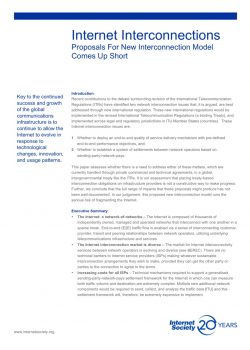[Editor’s note: This document was prepared in advance of the World Conference on International Telecommunication Regulations (WCIT-12) in 2012. Please see our full list of resources related to WCIT-12.]
Recent contributions to the debate surrounding revision of the International Telecommunication Regulations (ITRs) have identified two network interconnection issues that, it is argued, are best addressed through new international regulation. These new international regulations would be implemented in the revised International Telecommunication Regulations (a binding Treaty), and implemented across legal and regulatory jurisdictions in ITU Member States (countries). These Internet interconnection issues are:
-
Whether to deploy an end-to-end quality of service delivery mechanism with pre-defined end-to-end performance objectives, and;
-
Whether to establish a system of settlements between network operators based on sending-party-network-pays.
This paper assesses whether there is a need to address either of these matters, which are currently handled through private commercial and technical agreements, in a global, intergovernmental treaty like the ITRs. It is our assessment that placing treaty-based interconnection obligations on infrastructure providers is not a constructive way to make progress. Further, we conclude that the full range of impacts that these proposals might produce has not been well documented. In our judgement, this proposed new interconnection model runs the serious risk of fragmenting the Internet.
